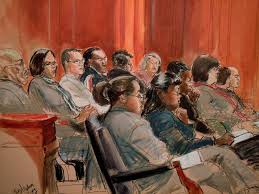
It seems to be in vogue with some trial judges currently to allow jurors to ask questions of witnesses after both sides of the litigation are finished asking their questions. This is currently a hot topic due to the Tex McIver trial, currently being tried in the Fulton County Superior Court in front of Judge Robert McBurney. Judge McBurney, rather famously, permits jurors to ask questions of witnesses after questioning by the prosecution and the defense counsel. Presumably, Judge McBurney allows this practice in civil cases as well as criminal cases, although Superior Court doesn’t see as many civil cases as criminal. All felonies in Georgia must be tried in Superior Court. The practice of Judge McBurney allowing witnesses to ask their own questions was discussed extensively before the trial in a podcast produced by the AJC called Breakdown. It is hosted by veteran legal affairs journalist Bill Rankin and I highly recommend it. In that podcast, defense counsel Bruce Harvey gives his opinion on why it is not only a bad practice to allow jurors to ask questions, but, also, why it is probably unconstitutional. For example, we all know that the 5th Amendment of the Constitution gives a criminal defendant the right to remain silent, even throughout the trial, so that the government must prove guilt beyond a reasonable doubt without any assistance from the defendant. Harvey, rightfully, preposes the hypothetical of a juror asking “Why didn’t the defendant take the stand to tell us what happened?” Of course, the judge is not going to permit that question to be answered, but the jurors (or at least the one juror who asked that question) will know the judge didn’t approve it and wouldn’t permit it to be answered, and the bias that answers “why” is naturally because the defendant must be guilty. So simply by denying that juror’s question, the 5th amendment constitutional right is implicated and violated because it was allowed even to be raised in court.
There has lately been alot of discussion in social media about this among lawyers, too. You can find some of this discussion on Twitter at #texmciver and in the comments on Facebook where WSBTV is livestreaming the trial. If I were to take a poll, I think the vast majority of trial lawyers is against the practice for the reasons stated above. Also, other websites are livestreaming the same WSBTV feed, like wildabouttrial and lawandcrime. Both of these websites have a comments section where viewers can post their comments about the trial. It is pretty fascinating, especially for court enthusiasts like me. On Facebook, there have been some thought-provoking comments about allowing jurors to ask questions of witnesses. Below are just some of the comments I have seen:
“I think there are two questions that judges should ask themselves before considering this. 1). Why would I allow jurors to ask questions? Whatever the answer is (to help the jurors clarify any issues that the holder of the burden of proof has not clarified, etc). 2). If I am am being a neutral, unbiased referee, should that matter to me?”
 Atlanta Injury Lawyer Blog
Atlanta Injury Lawyer Blog












